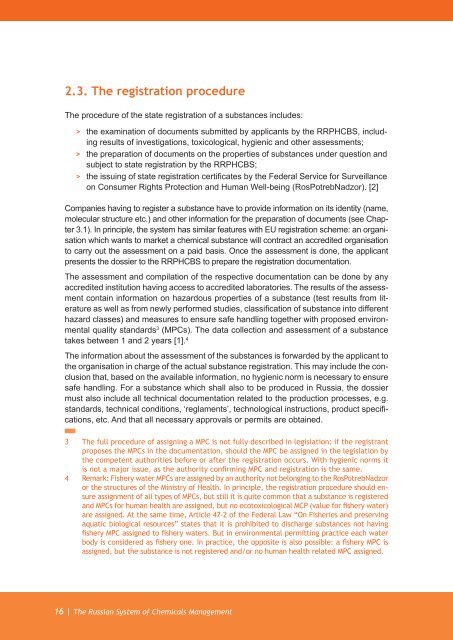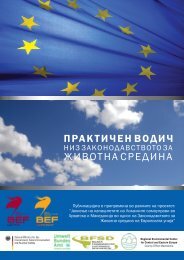The Russian system of chemicals management - Bef-de.org
The Russian system of chemicals management - Bef-de.org
The Russian system of chemicals management - Bef-de.org
You also want an ePaper? Increase the reach of your titles
YUMPU automatically turns print PDFs into web optimized ePapers that Google loves.
2.3. <strong>The</strong> registration procedure<br />
<strong>The</strong> procedure <strong>of</strong> the state registration <strong>of</strong> a substances inclu<strong>de</strong>s:<br />
>><br />
>><br />
>><br />
the examination <strong>of</strong> documents submitted by applicants by the RRPHCBS, including<br />
results <strong>of</strong> investigations, toxicological, hygienic and other assessments;<br />
the preparation <strong>of</strong> documents on the properties <strong>of</strong> substances un<strong>de</strong>r question and<br />
subject to state registration by the RRPHCBS;<br />
the issuing <strong>of</strong> state registration certificates by the Fe<strong>de</strong>ral Service for Surveillance<br />
on Consumer Rights Protection and Human Well-being (RosPotrebNadzor). [2]<br />
Companies having to register a substance have to provi<strong>de</strong> information on its i<strong>de</strong>ntity (name,<br />
molecular structure etc.) and other information for the preparation <strong>of</strong> documents (see Chapter<br />
3.1). In principle, the <strong>system</strong> has similar features with EU registration scheme: an <strong>org</strong>anisation<br />
which wants to market a chemical substance will contract an accredited <strong>org</strong>anisation<br />
to carry out the assessment on a paid basis. Once the assessment is done, the applicant<br />
presents the dossier to the RRPHCBS to prepare the registration documentation.<br />
<strong>The</strong> assessment and compilation <strong>of</strong> the respective documentation can be done by any<br />
accredited institution having access to accredited laboratories. <strong>The</strong> results <strong>of</strong> the assessment<br />
contain information on hazardous properties <strong>of</strong> a substance (test results from literature<br />
as well as from newly performed studies, classification <strong>of</strong> substance into different<br />
hazard classes) and measures to ensure safe handling together with proposed environmental<br />
quality standards 3 (MPCs). <strong>The</strong> data collection and assessment <strong>of</strong> a substance<br />
takes between 1 and 2 years [1]. 4<br />
<strong>The</strong> information about the assessment <strong>of</strong> the substances is forwar<strong>de</strong>d by the applicant to<br />
the <strong>org</strong>anisation in charge <strong>of</strong> the actual substance registration. This may inclu<strong>de</strong> the conclusion<br />
that, based on the available information, no hygienic norm is necessary to ensure<br />
safe handling. For a substance which shall also to be produced in Russia, the dossier<br />
must also inclu<strong>de</strong> all technical documentation related to the production processes, e.g.<br />
standards, technical conditions, ‘reglaments’, technological instructions, product specifications,<br />
etc. And that all necessary approvals or permits are obtained.<br />
3 <strong>The</strong> full procedure <strong>of</strong> assigning a MPC is not fully <strong>de</strong>scribed in legislation: if the registrant<br />
proposes the MPCs in the documentation, should the MPC be assigned in the legislation by<br />
the competent authorities before or after the registration occurs. With hygienic norms it<br />
is not a major issue, as the authority confirming MPC and registration is the same.<br />
4 Remark: Fishery water MPCs are assigned by an authority not belonging to the RosPotrebNadzor<br />
or the structures <strong>of</strong> the Ministry <strong>of</strong> Health. In principle, the registration procedure should ensure<br />
assignment <strong>of</strong> all types <strong>of</strong> MPCs, but still it is quite common that a substance is registered<br />
and MPCs for human health are assigned, but no ecotoxicological MCP (value for fishery water)<br />
are assigned. At the same time, Article 47-2 <strong>of</strong> the Fe<strong>de</strong>ral Law “On Fisheries and preserving<br />
aquatic biological resources” states that it is prohibited to discharge substances not having<br />
fishery MPC assigned to fishery waters. But in environmental permitting practice each water<br />
body is consi<strong>de</strong>red as fishery one. In practice, the opposite is also possible: a fishery MPC is<br />
assigned, but the substance is not registered and/or no human health related MPC assigned.<br />
16 | <strong>The</strong> <strong>Russian</strong> System <strong>of</strong> Chemicals Management



